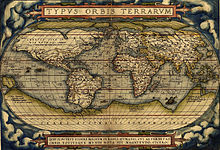
Back جغرافيا نقدية Arabic সমালোচনামূলক ভূগোল Bengali/Bangla Geografia crítica Catalan جوگرافیای ڕەخنەگرانە CKB Kritische Geographie German Geografía crítica Spanish جی ای اس کیفی Persian Géographie radicale French मानवतावादी भूगोल Hindi Kritička geografija Croatian
This article needs additional citations for verification. (October 2016) |
| History of geography |
|---|
 |
Critical geography is theoretically informed geographical scholarship that promotes social justice, liberation, and leftist politics.[1] Critical geography is also used as an umbrella term for Marxist, feminist, postmodern, poststructural, queer, left-wing, and activist geography.[2][3]
Critical geography is one variant of critical social science and the humanities that adopts Marx’s thesis to interpret and change the world. Fay (1987) defines contemporary critical science as the effort to understand oppression in a society and use this understanding to promote societal change and liberation.[4] Agger (1998) identifies a number of features of critical social theory practiced in fields like geography, which include: a rejection of positivism; an endorsement of the possibility of progress; a claim for the structural dynamics of domination; an argument that dominance is derived from forms of false consciousness, ideology, and myth; a faith in the agency of everyday change and self-transformation and an attendant rejection of determinism; and a rejection of revolutionary expediency.[5]
- ^ Gregory, Derek; Johnston, Ron; Pratt, Geraldine; Watts, Michael; Whatmore, Sarah (2011). The Dictionary of Human Geography. John Wiley & Sons. ISBN 9781444359954.
- ^ Best, U. (2009). Kitchin, Rob; Thrift, Nigel (eds.). International Encyclopedia of Human Geography. Oxford: Elsevier. pp. 345–357. ISBN 9780080449104.
- ^ Castree, Noel (2000). "Professionalisation, Activism, and the University: Whither 'Critical Geography'?". Environment and Planning A. 32 (6): 955–970. doi:10.1068/a3263.
- ^ Fay, Brian (1987). Critical social science: liberation and its limits. Cornell University Press. ISBN 9780801494581.
- ^ Agger, Ben (1988). Critical Social Theories: An Introduction. Avalon Publishing. ISBN 9780813321745.[permanent dead link]
© MMXXIII Rich X Search. We shall prevail. All rights reserved. Rich X Search